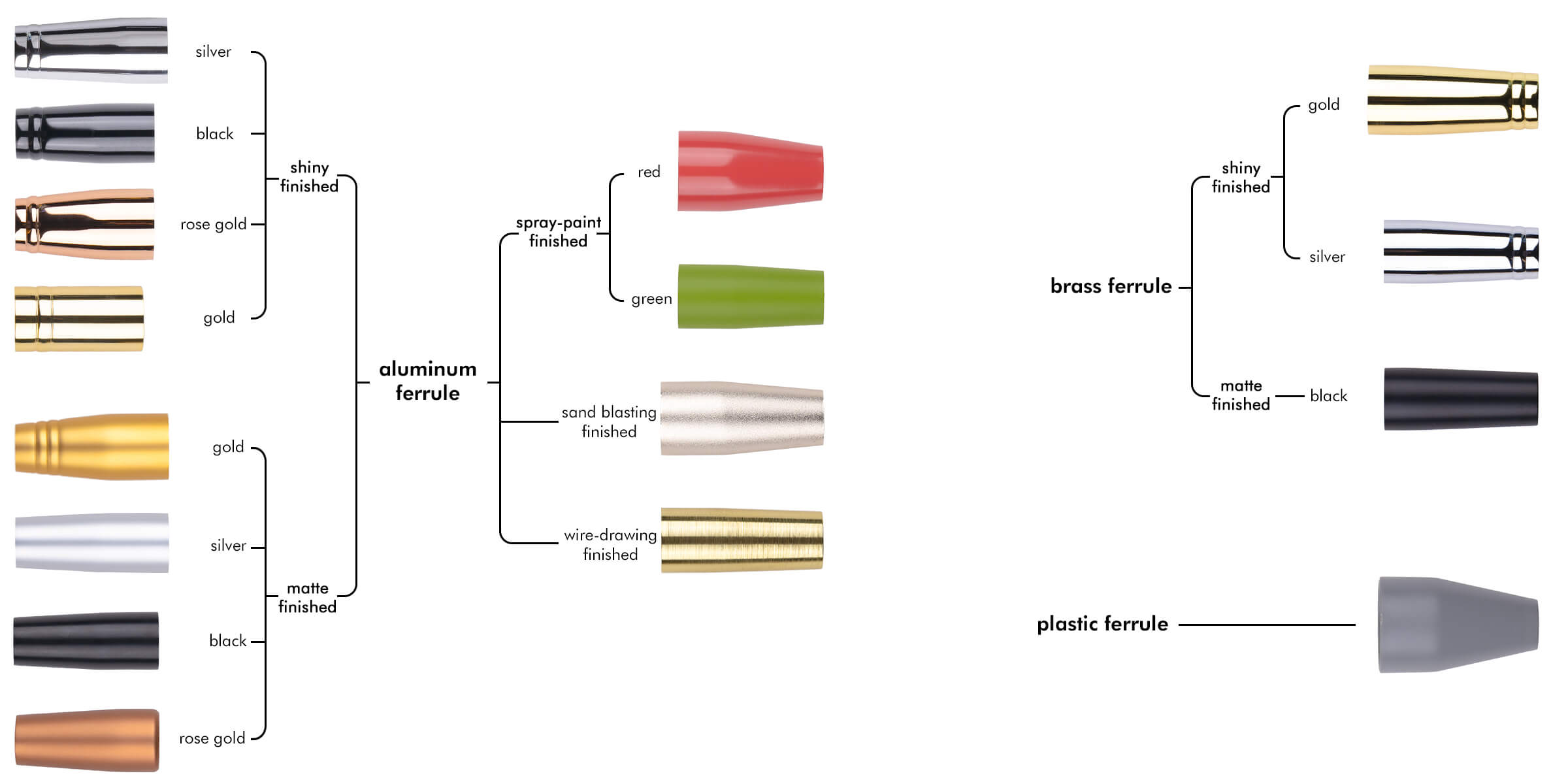+86 177 3459 9158
+86 177 3459 9158

A makeup brush ferrule is the metal part of the makeup brush that connects the bristles to the handle. It’s essential for holding the bristles securely in place, preventing them from shedding or loosening during application. Typically made from materials like aluminum, brass, or copper, the ferrule is crimped at the bottom, where it attaches to the handle, creating a tight fit to maintain durability.
In addition to securing the bristles, the ferrule also helps maintain the brush’s shape and balance. A well-made ferrule contributes to the brush’s overall weight and stability, making it easier to control for precise application. Some ferrules may be plated or painted for aesthetic appeal, and high-quality brushes usually have reinforced ferrules to ensure longevity.
Let's get down to business. When it comes to makeup brushes, we often focus on the bristles and handles, but let's not overlook the unsung hero holding it all together—the ferrule! This little metal piece is the glue (well, not literally) that keeps your bristles intact and ensures a sturdy, long-lasting brush. Today, we're diving into the world of ferrule materials, focusing on the two most common contenders: brass and aluminum. So, grab your favorite brush and let's talk metal!
Brass ferrules are like the gold standard (pun intended) in the makeup brush world. Why? Because brass is strong, durable, and adds a touch of luxury to your beauty tools. This material is an alloy made of copper and zinc, giving it that iconic yellowish-gold hue that's both chic and sturdy.
But brass isn't just about looking pretty—it's also corrosion-resistant, meaning it can withstand the daily wear and tear of makeup application and cleaning. Plus, it has a good weight to it, giving your brushes a balanced feel that professional makeup artists adore. However, brass does come with a higher price tag, making it more common in high-end, professional-grade brushes. But hey, sometimes you have to pay a little extra for the best, right?
On the other hand, we have aluminum, the featherweight champ of ferrules. If brass is the luxury sedan of ferrules, aluminum is the sleek, sporty coupe. It's lightweight, which makes it perfect for those who prefer brushes that feel almost weightless in hand.
Aluminum ferrules are also rust-resistant and won't tarnish over time, so your brushes can look as good as new even after countless uses. The metal's flexibility makes it easy to mold into various shapes and designs, which is why you'll find it in a wide range of makeup brushes, from budget-friendly to mid-range. And let's not forget, aluminum can be anodized to achieve different colors, so it's not just functional but also a bit of a chameleon, blending with any design you fancy.
Choosing between brass and aluminum ferrules often comes down to personal preference and budget. If you're after a brush that feels substantial and exudes luxury, brass is your go-to. But if you want something lightweight, versatile, and still durable, aluminum is a fantastic choice.

The Great Ferrule Face-Off: Brass vs. Aluminum in Makeup Brushes
At Green Brush, we offer both brass and aluminum ferrules in our customizable makeup brushes, allowing you to choose the material that best suits your brand's needs. Whether you're looking for the timeless appeal of brass or the modern, lightweight charm of aluminum, we've got you covered. After all, a great brush isn't just about what's on the surface—it's about what's holding it all together.
So, next time you pick up your favorite makeup brush, give a little nod to the ferrule—it's doing more work than you might think!

Contact Us
Related Keywords
Who Invented Eyeshadow? A Journey Through the AgesConsumer Behavior: Why Are Custom Makeup Brushes So Attractive?Top Materials for Custom Makeup Brush Handles in 2024China Round Powder Brush WholesaleConnections and Differences Between Makeup BrushesThe Great Ferrule Face-Off: Brass vs. Aluminum in Makeup BrushesLooking for High-Quality Makeup Brush Manufacturers? Don’t Miss GREEN BRUSH!Denim CollectionWhat Kind of Loose Powder Brush Is Suitable for Different Face Shapes?Best Ways to Soften Makeup BrushesEssential Eye Brushes for BeginnersGREEN BRUSH: Private Label Makeup Brushes WholesaleGREEN BRUSH: Vegan Fiber Makeup Brush ManufacturerDifferent Styles of Makeup Brush Packaging: Find the Perfect Fit for Your BrandWhat Bacteria Grows on Makeup Brushes?Cheap vs. Expensive Makeup Brushes: Here's What You Need to KnowCangzhou, Hebei: World's Largest Handmade Makeup Brush Production HubTop 5 Reasons to Choose Bamboo Makeup BrushesWhich Certifications Can Verify the Quality of Makeup Brushes?How to Maintain Makeup Brushes in Different Seasons?What is a Kabuki Makeup Brush?How Makeup Brush Sizes Are Defined: A Look Into Industry StandardsGREEN BRUSH: FSC Cosmetic Brush ManufacturerA Guide to Makeup Brushes with Names and UsesThe Process of Custom Your makeup brushesGREEN BRUSH: Antimicrobial Makeup Brush ManufacturerWhat Factors Affect the Price of Makeup Brushes?How to Use a Concealer Brush for Beginners: A Step-by-Step GuideTaklon Fiber: Elevating Custom Makeup Brush DesignFoundation Brush vs. Powder Brush: What's the Difference?Sponge or Brush for Foundation: Which One Is Right for You?China ODM/OEM Cosmetic Brush ManufacturerSafe and Fun Makeup Brushes for Kids: What to Look ForDiscover the Ultimate Destination for Bulk Makeup Brush Purchases: Green BrushWhat Are Makeup Brushes Made from Recycled Materials?Private Label Makeup Brushes WholesaleHow to Create Your Private Label Makeup BrushCultural Influences on Makeup Brushes: Design and Regional PreferencesGlobal Makeup Brush Market Status and Future Analysis Report (2025)Essential Tools for Cleaning Makeup BrushesThe Science Behind Antimicrobial Makeup BrushesThe Best Way to Dry Your Makeup BrushesCan I Share My Makeup Brushes with Other People?Nylon Makeup Brushes - A Sustainable Choice for the Eco-Conscious Beauty EnthusiastLeave a Message
